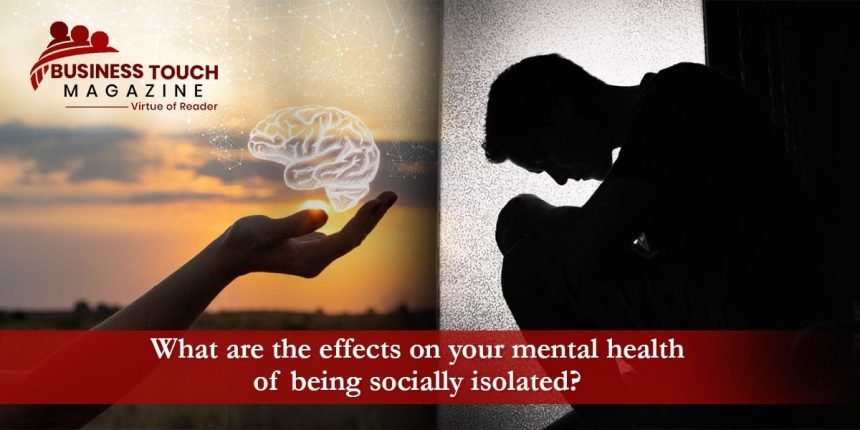People over the age of 65 are in danger of developing dementia and other major medical disorders due to feelings of loneliness and social isolation, which affects many Americans.
According to a survey from the National Academy of Sciences, Engineering and Medicine (NASEM), many older persons feel alone and lonely. More than one-third of adults aged 45 and older reported feeling lonely.
Older persons are more prone to experience loneliness and social isolation due to living alone, having lost loved ones or friends, having a chronic condition, and losing their hearing.
Although social interaction may help alleviate loneliness, it does not alleviate it completely. If you are socially isolated, you do not have any contacts. Those who are socially isolated may experience loneliness, whereas those who are not socially isolated may nevertheless experience loneliness.
So how can you tell the difference between social exclusion and a sense of isolation?
Dr Radecka explains that ‘the primary distinction between social isolation and loneliness is how individuals feel them’. There are few persons with whom you may frequently socialize in a condition of social isolation.’ According to the concept of loneliness, others might surround you and yet feel alone.
When you have little or no touch with other people, you are in social isolation. Some individuals may get lonely due to social isolation, but this is not the only way to experience loneliness.
It is not the number of social connections that is important, but rather the quality, according to Dr Radecka. While social media helps keep us connected, it can also lead to lower-quality relationships. According to research, social media use has been linked to feelings of isolation.
The elderly are not the only ones who are lonely
As many as one in three persons over the age of 65 in certain nations suffer from loneliness. Loneliness and social isolation may be exacerbated by living alone, the loss of friends or family members, and poor health among older persons, according to Dr Radecka.
However, social isolation may have a negative impact on everyone at some time in their lives. Some people become socially isolated due to life events, such as the loss of a loved one, the breakup of a relationship, or relocating to a new location. As for some people, it is a long-term issue.
A lack of interaction with others and a lack of stimulation in our minds
Dr Radecka believes that research demonstrates that the loneliness of social isolation may affect brain function and cognition. The following regions of the brain have been discovered to be significantly affected:
Prefrontal cortex
Social behaviour, decision-making, and long-term memory all benefit from the activity of this region of the brain. This area’s capacity and usefulness may be diminished if it is not exposed to frequent social interactions.
Hippocampus
This part of the brain controls a large part of our ability to cope with stress. According to a recent study, the stress hormone cortisol was shown to be greater in persons with a smaller social circle.
Amygdala
Research reveals that this portion of the brain has a higher volume in this region for persons who have an active social life.
Dr Radecka discusses that social isolation may affect our memory and how we absorb information. According to this research, social isolation has been shown to hasten cognitive decline, and loneliness has been linked to an increased chance of getting dementia, particularly Alzheimer’s.
Our mental health is affected by social isolation
Our mental well-being needs to maintain frequent contacts with others, such as in the form of friendships, communities, and support networks.
There is a link between social isolation and mental health concerns like anxiety and depression, and mental health difficulties might make you more likely to suffer from loneliness. It has even been shown that social isolation may diminish life expectancy. In the absence of underlying health conditions, socially isolated people have a higher risk of dying prematurely.
In contrast to the negative impacts of social isolation, there is evidence that re-socializing and forming new relationships may help reverse those effects. Residents who had cognitive deterioration while under lockdown recovered swiftly once restrictions were lifted in a recent research done during the epidemic.
How to deal with the negative impacts of social isolation
Asking for assistance might be challenging if you face loneliness and a sense of being cut off from the rest of the world. Many people avoid admitting that they are lonely because of the stigma attached to the word. Even if you do not have to, Dr Radecka recommends that you do so. ‘Remember that feeling lonely is nothing to be ashamed of — it is a natural human emotion.’
In order to counteract the negative impacts of social isolation, here are a few suggestions:
1. Make it a priority to connect with others
Make little attempts to interact with people, even if it seems complicated. ‘Quality, not number, is the issue here,’ says Dr Radecka, a psychologist. A weekly phone call or arranging a chat with an old friend might do wonders for your self-esteem.
2. Involve yourself in your neighbourhood
Having a strong feeling of belonging comes from belonging to a group of people. Take a class that interests you. Dr Radecka believes that engaging in things we like is essential for our mental health and an excellent opportunity to meet new people. Consider joining a reading club, a dog walking organization, a chorus, or a community garden to give back to the community. According to one research, singing in a group has a considerable positive impact on one’s mental health.
3. Get going
Being physically active may help those who suffer from social anxiety and depression, according to Dr Radecka. ‘It increases the brain’s feel-good neurotransmitters and lowers stress hormones such as adrenaline and cortisol,’ says the researcher.
4. Seek assistance
Doctor Radecka advises those suffering from social isolation and loneliness to speak out to loved ones or a health care provider.
A Livi doctor or therapist may evaluate the symptoms you are experiencing, and treatment options can be discussed.
Creating a Better Environment for All
Social isolation is a significant public health problem that public health specialists address. Tulane University’s online Master of Public Health (MPH) degree is designed for those who want to serve on the front lines of public health.
There is a wide range of topics covered in the MPH programme at Tulane’s School of Public Health and Tropical Medicine. These topics range from biostatistics and data science to environmental health sciences and epidemiology to global community health and behavioural sciences and health policy and management.
Aspiring public health practitioners committed to serving their communities would benefit from Tulane’s online MPH programme, which is geared at those in their early and mid-career years. Graduates work to improve health inequities and build more healthy communities.




